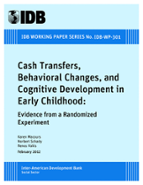Cash Transfers, Behavioral Changes, and Cognitive Development in Early Childhood: Evidence from a Randomized Experiment
Date
Feb 2012
Cash transfer programs have become extremely popular in the developing world. There is a large literature on the effects of these programs on schooling, health and nutrition, but relatively little is known about possible impacts on child development. This paper analyzes the impact of a cash transfer program on cognitive development in early childhood in rural Nicaragua. Identification is based on random assignment. We show that children in households assigned to receive benefits had significantly higher levels of development nine months after the program began. There is no fadeout of program effects two years after the program had ended and transfers were discontinued. We show that the changes in child development we observe are unlikely to be a result of the cash component of the program alone.



